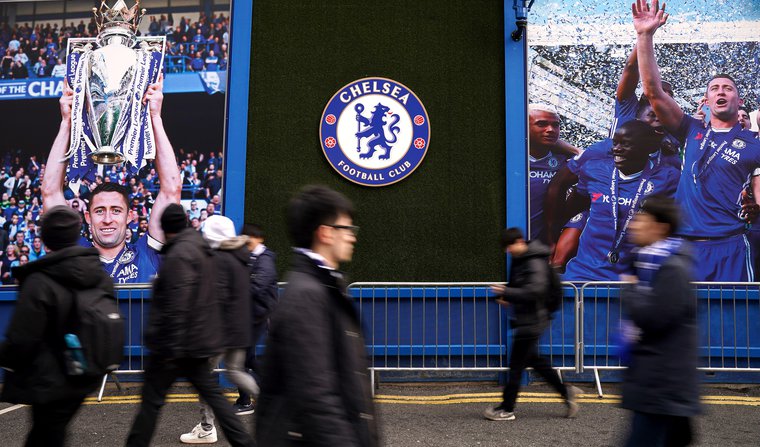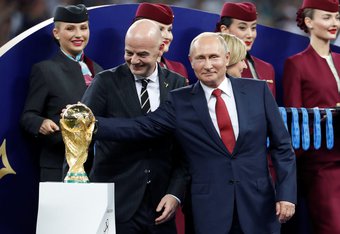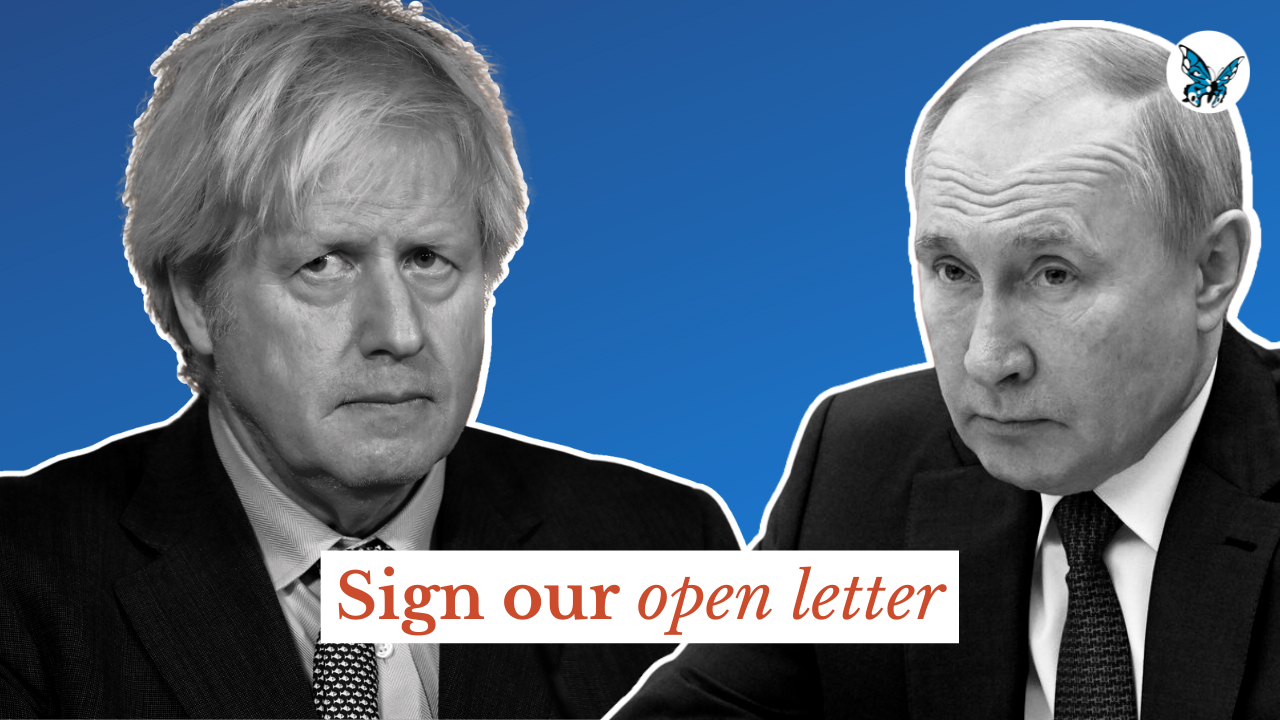For years, the UK has turned a blind eye to overseas billionaires, including Putin-linked oligarchs, buying up English football teams
James Montague
22 March 2022

Chelsea's owner Roman Abramovich has been sanctioned by the UK government |
PA Images / Alamy Stock Photo
Back in 2016, I was on a bus as it toured around some of London's most salubrious neighbourhoods.
I was writing a book called ‘The Billionaires Club’ about the super rich investing in football. I wanted to know: where did all this new money come from? And why was so much of it flowing into the game?
The bus trip gave me some insight into that. It was a ‘Kleptocracy Tour’, hosted by Vladimir Ashurkov, a Russian exile who was the executive manager at Russian opposition leader Alexey Navalny's Anti Corruption Foundation. With Ashurkov as our guide, we viewed the fabulously appointed palaces and opulent mansions bought by the global super-rich using fortunes siphoned from the world's kleptocracies. Russia led the pack: much of its cash had been plowed into prime London real estate. And, of course, into a different kind of prime real estate: football clubs.
There was, among others, Roman Abramovich, the owner of Chelsea FC, and his £125m Kensington palace that used to be the Russian embassy. There was Alisher Usmanov, a former major shareholder in Arsenal who now invests heavily in Everton, and his £50m Hampstead abode. And a 5,380 square foot mega apartment overlooking the Thames and Whitehall Gardens, owned by a company controlled by the wife of Igor Shuvalov, Russia’s former first deputy prime minister and the man in charge of delivering the 2018 World Cup finals. Ashurkov and Navalny had highlighted Shuvalov as a key official in an alleged corrupt scheme involving Abramovich and Usmanov, which appeared to enrich Shuvalov’s own family. At the time, the Russian government said no laws were broken.
London was full of properties, Ashurkov said, that were the “ill-gotten gains of Russian officials or of cronies of the current people in the administration…they bring their money to Britain, they buy property, they buy companies, and with this money comes the corrupt practices that people are used to at home.”
No one really listened until Putin unleashed his vicious war against Ukraine. All three men have now been sanctioned by the British government. Shuvalov is banned from visiting his wife's penthouse. Abramovich's assets have been frozen and Chelsea is being sold by the British government, while the English Premier League has disqualified him from being a club director. And Usmanov is unlikely to ever visit Everton's new stadium, even though his company USM paid £30m just to secure first refusal of any naming rights deal.
But what has been most striking about the news that football is awash with money connected to Putin is that it isn’t news at all. Russia's oligarchs have always hidden in plain sight, with Abramovich both the most secretive and the best known. Since he bought Chelsea in 2003, he has sunk at least £1.5bn into the club, winning 21 trophies, while his connections to Putin and allegations of corruption, have been largely ignored.
Related story

Football has for too long been in Putin’s pocket. It’s time for reform
2 March 2022 | David Goldblatt
Sport had the chance to speak out against Russia in 2014 and 2018. It has only acted now because it has been forced to do so
In 2012, Abramovich was being sued by his former business partner Boris Berezovsky, who claimed he was owed billions of pounds. Abramovich won the case, but his lawyers admitted in the High Court that he had made corrupt payments to secure a Russian oil company for $250m in a rigged auction. Ten years later, he sold it to the Russian state for $13bn. But he was still considered a fit and proper person to own a UK football club. As he was after the 2014 invasion of Ukraine, when Navalny had called on Abramovich and Usmanov to be sanctioned. “You can draw up a blacklist of about a thousand people who will no longer be allowed entry into Western countries, and you can do it quietly, without any big announcement, but you have to hit the propagandists of war, the ones who finance the war, the real party of war,” he said in a 2015 interview with the Financial Times. “Usmanov, Abramovich, and their families … If they can’t get to their residences in London or in Switzerland, that will make a difference.”
Then there was the 2018 Salisbury poisoning, when dissident defector Sergei Skripal was targeted with a nerve agent. Shortly afterwards, the British government delayed renewing Abramovich's work visa. He withdrew his application and is now an Israeli citizen. But it didn't impact his ownership of Chelsea.
As Labour MP Chris Bryant told the House of Commons shortly before Abramovich was sanctioned last month, using parliamentary privilege to quote from a leaked 2019 Home Office document: “As part of HMG's [Her Majesty's Government] Russia strategy aimed at targeting illicit finance and malign activity, Abramovich remains of interest to HMG due to his links to the Russian state and his public association with corrupt activity and practices. An example of this is Abramovich admitting in court proceedings that he paid for political influence.”
Only now, as Ukraine burns, has it become an issue. The UK Treasury's Financial Sanctions Notice stated that Abramovich was “a prominent Russian businessman and pro-Kremlin oligarch” who was “associated with a person who is or has been involved in destabilising Ukraine and undermining and threatening the territorial integrity, sovereignty and independence of Ukraine, namely Vladimir Putin, with whom Abramovich has had a close relationship for decades.”
It isn't only Russian money that has flooded English football. Billionaires from the US, China, Thailand and beyond have all bought Premier League clubs. Their motivations are often opaque. American owners tend to see the possibility of extracting profit from soccer in the future. Others chase the reputational benefits. A football club gives a kind of benign visibility – on the biggest billboard in the world – that is perfect for reputation laundering, sometimes called sportswashing.
Abramovich never adequately explained why he bought Chelsea. At the time he said he was simply a young guy looking for some fun. Having assets and visibility outside of Russia was also, of course, useful in case you fell out of favour with the Kremlin, as the likes of Berezovsky and Mikhail Khodorkovsky did, and had their fortunes and freedom threatened.
In her book ‘Putin's People’, former Financial Times Moscow correspondent Catherine Belton spoke to Sergei Pugachev, once a member of Putin's inner circle, who claimed the Russian president had identified Chelsea FC as a potential forward operating base for Russian money and influence. “Putin personally told me of his plan to acquire the Chelsea Football Club in order to increase his influence and raise Russia’s profile, not only with the elite but with ordinary British people,” he alleged. Abramovich denied this, and, along with several other oligarchs, sued for libel and data protection breaches. The case, which led a spokesperson for the Index on Censorship to say London’s courts were becoming a place to “quash critical journalism, not only in the UK, but around the world”, was settled out of court when HarperCollins agreed that some information concerning the oligarch had been inaccurate. The book remains on the shelves with corrections.
Staggering hypocrisy
It is those billionaires with state connections that are invariably the most powerful. Manchester City has been owned by Sheikh Mansour, a senior member of the Abu Dhabi royal family and a deputy prime minister of the UAE, since 2008. The club has been transformed into one of Europe's best, as well as a massive advertising hoarding for the UAE, one of the world's least democratic countries. And last year, the English Premier League eventually approved the purchase of Newcastle United by a consortium that was 80% owned by Saudi Arabia's sovereign wealth fund, the PIF. The PIF is chaired by the Saudi crown prince, Mohammed bin Salman (MBS), who, along with the UAE's crown prince Mohamed bin Zayed, has been one of the architects of the ruinous war in Yemen that has taken hundreds of thousands of lives.
US intelligence concluded that MBS was also responsible for ordering the murder of Saudi dissident Jamal Khashoggi. The Newcastle takeover was opposed by Hatice Cengiz, the fiancee of Khashoggi. “I can say that the one incident that has hurt the reputation of Saudi Arabia the most was Jamal’s murder. It has destroyed his [MBS’s] reputation, he’s desperately trying to use these types of deals to repair his image,” she told me.
“Since the murder, many companies and countries don’t want to partner or do business because of the backlash. He wants legitimacy and credibility. Buying a team like Newcastle in the Premier League, in one of the most powerful countries in Europe and the world? You buy legitimacy in the international community. He’s accepted and celebrated for rescuing a struggling team. Everyone then sees everything in a different light.” Mohammed bin Salman strongly denied the allegations that he ordered Khashoggi’s death and the Premier League was convinced that Newcastle United would not be controlled by the Saudi state and approved the deal.
Related story

We must realise the threat posed by Saudi Arabia’s Newcastle ‘sportswashing’
12 October 2021 | Nicholas McGeehan
Sportswashing launders the reputations of thugs and despots, but it also diminishes our democratic institutions
Abramovich's connections to Putin were known for two decades. It appears his money was not welcome only when the reputational cost of doing business with him was too high. And what about the other football clubs that are equally as compromised?
Last week, British prime minister Boris Johnson wrote an article in The Telegraph bemoaning the West's “addiction” to Russian oil. “If the world can end its dependence on Russian oil and gas,” he wrote, “we can starve him of cash, destroy his strategy and cut him down to size.”
Soon after, Johnson flew to Riyadh to meet Mohammed bin Salman – 72 hours after Saudi Arabia executed 81 people in a single day – to beg the country to raise its oil production to plug the gap from the loss of Russian oil. Labour leader Keir Starmer accused Johnson of “going cap in hand from dictator to dictator.”
For now, the days of Russian money in football appear to be over. London's high-end estate agents will no doubt be sad, but a new age of extreme wealth and power investing in the game for political ends is only just beginning.
Order an inquiry into Putin-linked cash in British politics

To: Boris Johnson
We, the undersigned, are concerned at this time of tension with Russia about the influence of Vladimir Putin’s regime in UK politics
- We note that that the Conservative Party received significant amounts of money from Russian donors and their associates, including from people with apparent links to Putin’s government..
- We note that oligarchs and officials from former Soviet republics with high levels of corruption have purchased more than £2bn worth of property in the UK.
- We note that more than 200 Russian millionaires have bought their way into the UK in the last seven years, despite the government’s pledge in 2015 to stop corrupt oligarchs exploiting the system.
- We note that parliament’s Intelligence and Security Committee’s “Russia Report” found that “Russian influence in the UK is ‘the new normal’”.
- We note that the same report recommended that there should be an investigation into Russian interference in the 2016 Brexit referendum, something which has not happened yet.
At a time when Putin’s administration threatens global peace, we cannot simply hope for the best. We call on you to immediately order an inquiry into whether or not money linked to Vladimir Putin’s regime is influencing UK politics.
No comments:
Post a Comment